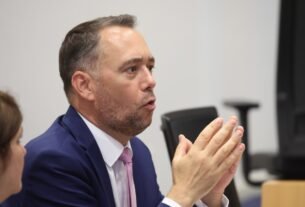PARIS – The Socialist Party (PS) may be out of the habit, but it has once again become a central player in French politics.
For decades, the PS was a key pillar of national political life, sending titans like François Mitterrand from the party’s imposing headquarters on Rue Solferino out into the heart of world affairs.
That era ended in 2017 when Emmanuel Macron seized the presidency, and the PS plummeted further in 2022 with just 1.75% of the first-round presidential vote.
Now, centrist Prime Minister François Bayrou’s bold – many say foolhardy – move to call a confidence vote on 8 September has thrust the socialists into the limelight once again.
The party holds only 66 of the 577 seats in the National Assembly. Yet, it is presenting itself as “ready to govern” and offering to negotiate a new 2026 budget. Its room for manoeuvre may be narrow, but the Élysée appears to be listening.
On Tuesday, Macron invited members of the current governing coalition to “work with the socialists” to prepare for the post-Bayrou era.
The message was well received by PS leader Olivier Faure, who declared himself “at the disposal, of course, of the head of state” to discuss “the conditions” under which the left could “take up the government positions currently held by Bayrou’s relative majority.”
Just a week earlier, Socialist leaders had vowed to govern with other left-wing forces – excluding the far-left La France Insoumise (LFI), with whom ties have frayed. They ruled out forming a governing coalition with the parties currently in power.
By unveiling a plan to reduce the deficit by €21.7 billion in 2026 – through €14 billion in savings and €26.9 billion in revenue – the PS intends to “set a political course,” Emma Rafowicz, a Socialist MEP, told Euractiv.
The party proposes building the 2026 budget with parliament and avoiding using Article 49.3, the constitutional shortcut that allows governments to force legislation through without a vote.
“Everyone must come without taboos or sacred cows,” confirmed Socialist senator Rachid Temal, in order to “restore hope to the French” and “make the country work.”
An elusive majority
The obstacle is numbers. To even reach budget debates, any left-leaning cabinet would first need to survive no-confidence votes that are sure to be tabled against it.
LFI’s leader in the National Assembly, Mathilde Panot, has already warned that she will not support a left-wing government that negotiates the budget with the current governing parties.
Meanwhile, RN leader Marine Le Pen confirmed on Tuesday, after a meeting with Bayrou, that she is calling for an “ultra-rapid” dissolution of the National Assembly.
Blocked on the left and by the far right, the socialists want to believe that deputies from the “central bloc” will be ready to make concessions.
Last Sunday, Justice Minister Gérald Darmanin, a member of Macron’s party, seemed willing “to save the essential,” through a “national union.” But he was mostly preaching to his own choir, as his name circulates among those who could succeed Bayrou.
To secure a compromise position, some socialists might be tempted to push for Bernard Cazeneuve’s candidacy. A former prime minister under François Hollande, Cazeneuve left the PS during the 2022 legislative elections to protest the alliance between the socialists and LFI.
The now-confirmed rift between the two parties could work in his favour, his supporters believe.
“Cazeneuve has a reassuring profile for part of the right,” said one of his backers, who believes that all of the “governing left” must come together.
However, for many PS activists and a good number of its leaders, the name Bernard Cazeneuve is still associated with the liberal policies that led to the party’s electoral collapse in the late 2010s.
The ‘dissolution plan’
If no compromise proves possible within the National Assembly and Macron decides on a new dissolution – which he has so far refused to consider – socialist leaders say they already have a “plan” for the legislative battle.
The party would field Socialist candidates against LFI in all winnable left-wing constituencies, only choosing unity in those where the far-right RN could prevail.
“This would be a monumental strategic error that would only reopen the war of the lefts,” said former LFI MP Hendrick Davi, who now sits with the Greens in the National Assembly.
“Everyone must instead realise that a catastrophic scenario is possible, that is, the far right coming to power,” he added.
According to the latest polls, in the event of new elections, the RN would lead with 31% of the vote. The left would be in second place, whether united with 23.5% or divided, with the PS, Greens, and Communists at 16.5% and LFI at 10%.
(mm, vc)





